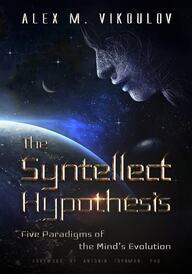Hyper-Perspectivism: Connect the Dots in Your Own Unique Kind of Way
by Alex Vikoulov  "Representation of the world, like the world itself, is the work of men; they describe it from their own point of view, which they confuse with the absolute truth." -Simone de Beauvoir
"Representation of the world, like the world itself, is the work of men; they describe it from their own point of view, which they confuse with the absolute truth." -Simone de Beauvoir
Absolute truths are hard to come by, which is the basic premise of ‘hyper-perspectivism’. Rather, truths are always in the eyes of the beholder, truths are always observer-relative, truths are “made” by a “truth-maker.” You can approach our multifaceted reality from an incredibly large number of angles. Since our informational world is of mental abstractive construction (as I make my case in the present book), it’s always up to you to decide what’s real to you – everything you find real is indeed real to you, not necessarily real to others who are at the same time, for a lack of a better word, your past and future incarnations. We all are different points of view on oneself, within our own holographic self-reflection. We all are like droplets on the cobweb of reality reflecting one another. That said, science is not to be taken for absolute truth – it’s a collection of systematized up-to-date knowledge with provisional models of reality.
To any unique perspective what’s really important is contextual relevance and logical consistency. What’s relevant? To scientists who are trained skeptics, hard evidence preferably mathematized and peer-reviewed is a convertible currency. But then again, in most cases we first invent a concept or a theoretical model and then math to back them up. Given enough time, even “hard evidence” is usually swept away with unavoidable paradigm-shifting intellectual progress. I’m not denigrating our scientific achievements, on the contrary, they are the keys for higher levels of the game.
As Buddha once famously said, as quoted in Kalama Sutta: “Do not believe in anything simply because you have heard it. Do not believe in anything simply because it is spoken and rumored by many. Do not believe in anything simply because it is found written in your religious books. Do not believe in anything merely on the authority of your teachers and elders. Do not believe in traditions because they have been handed down for many generations. But after observation and analysis, when you find that anything agrees with reason and is conducive to the good and benefit of one and all, then accept it and live up to it.”
You are the ultimate reality, change the perspective and your life becomes a mirage. Examine a DNA molecule through an electron microscope, or observe Earth from orbit, or drop LSD for innerspace psychedelica, and you’ll ascertain equally valid layers of hyperreality accessible to us modern humans. These “layers of truth” would seem very weird to a prehistoric caveman, and levels of hyperreality are going to turn out far stranger than our wildest imaginings.
Without invoking mysticism, Andy Clark’s Extended Mind hypothesis and Marshall McLuhan’s Media Extensions of Man put forth that consciousness is not confined to the body. As journalist Michael Pollan argues in his recent book “How to Change Your Mind” (2018) about psychedelics, if any of us were to experience another person’s inner world it would likely feel like a psychedelic trip, given how outlandish the sensations and observations would be. In a manner of speaking, we’ve been living in culturally sanctioned virtuality as long as we’ve been human beings. Philosopher Nietzsche emphasized that there are no facts only interpretations. The constructs of our conscious minds direct our interpretations and memories to ‘in’-form the reality we constantly create.
Even if you subscribe to philosophy of scientific materialism, when you end up believing that Homo sapiens is an accidental, insignificant species on a unremarkable planet orbiting an average sun somewhere on the outskirts of an ordinary galaxy of the ‘block universe’, this view still could hold bona fide in its own “good ol’ science” domain albeit overall “boxy.” It’s like when you start ascending on a hot air balloon from the valley, all outlooks are “legit” but dependent on how high you float in the air. At low altitude, you still see leaves on the trees and other small objects. The higher you ascend, the further you can see, the grander perspective on the valley you shall behold.
Some people remain oblivious, and some stubbornly myopic of the self-evidence of computational, fractal Nature – it’s a “matryoshka” of conscious systems. You’re smacked in the middle co-producing your own experiential reality. As YOU-niverse of ever-expanding structures of consciousness, you’re not marginalized, unless you belittle yourself, despite proselytizing attempts in certain parts of traditionally objective-reductionist science to indoctrinate its soulless dead-end philosophy without meaning or purpose.
Although the organizing principles of the contemporary scientific theories vary, all strive to uphold some version of the so-called relationalism of 17th- and 18th-century German philosopher Gottfried Leibniz. Broadly speaking, relationalism holds that space emerges from a certain pattern of correlations among objects it contains. In this view, space is a web of relationships with a certain pattern of connectivity. The relations are predicated on quantum theory or other principles, and the spatial arrangement arises from that. In my everyday life, I cannot operate from only one fixed perspective, at any given moment I have to choose the most appropriate outlook deemed relevant by my mind; conflicting beliefs may be on the “scroll-down menu,” too. An idealist as I am, no matter how hard I try, I can’t help but refer to objects and people grounded in the material world. But using this kind of perspectivism as an argument against philosophical grounding of various models of reality can lead to hyper-perspectivism. Modern perspectivism rooted in the personal or collective logic which shapes its scope can be transcended through construction of hyper-perspectivistic prisms based on oftentimes unexpected multi-disciplinary interrelationships. All you have to do is to connect the dots.
In my everyday life, I cannot operate from only one fixed perspective, at any given moment I have to choose the most appropriate outlook deemed relevant by my mind; conflicting beliefs may be on the “scroll-down menu,” too. An idealist as I am, no matter how hard I try, I can’t help but refer to objects and people grounded in the material world. But using this kind of perspectivism as an argument against philosophical grounding of various models of reality can lead to hyper-perspectivism. Modern perspectivism rooted in the personal or collective logic which shapes its scope can be transcended through construction of hyper-perspectivistic prisms based on oftentimes unexpected multi-disciplinary interrelationships. All you have to do is to connect the dots.
-Alex Vikoulov
P.S. That was an abridged excerpt from my new book "The Syntellect Hypothesis: Five Paradigms of the Mind's Evolution" available now on amazon.com, bn.com, and directly from EcstadelicNET webstore. Order Now! Available Formats: eBook | Paperback | Hardcover |
Autographed Copy
Order Now! Available Formats: eBook | Paperback | Hardcover |
Autographed Copy
Tags: consciousness, hyper-perspectivism, absolute truth, Simone de Beauvoir, truth-maker, provisional models, hyperreality, Andy Clark, Extended Mind hypothesis, Marshall McLuhan, Media Extensions of Man. Michael Pollan, How to Change Your Mind, psychedelics, psychedelic trip, Nietzsche, scientific materialism, Homo sapiens, block universe, computational, fractal Nature, matryoshka of conscious systems, experiential reality, structures of consciousness, relationalism, Gottfried Leibniz, idealism, syntellect hypothesis
*Image Credit: Shutterstock
About the Author:
Alex Vikoulov is a futurist, digital philosopher, neo-transcendentalist, cosmist, transhumanist singularitarian, consciousness researcher, evolutionary extrapolist, painter, essayist, media commentator, author of "The Syntellect Hypothesis: Five Paradigms of the Mind's Evolution," "The Origins of Us: Evolutionary Emergence and The Omega Point Cosmology," "The Physics of Time: D-Theory of Time & Temporal Mechanics" (2019). Lives in Burlingame, California (San Francisco Bay Area). More Bio...
e-mail: alexvikoulov@ecstadelic.net
#element-b0dfdc1f-8b84-4c8a-b3ef-d8ac87fdc9b1 .wgtc-widget-frame { width: 100%;}#element-b0dfdc1f-8b84-4c8a-b3ef-d8ac87fdc9b1 .wgtc-widget-frame iframe { width: 100%; height: 100%; border-collapse: collapse; border: 0 none;} Follow us ↴
 "Representation of the world, like the world itself, is the work of men; they describe it from their own point of view, which they confuse with the absolute truth." -Simone de Beauvoir
"Representation of the world, like the world itself, is the work of men; they describe it from their own point of view, which they confuse with the absolute truth." -Simone de BeauvoirAbsolute truths are hard to come by, which is the basic premise of ‘hyper-perspectivism’. Rather, truths are always in the eyes of the beholder, truths are always observer-relative, truths are “made” by a “truth-maker.” You can approach our multifaceted reality from an incredibly large number of angles. Since our informational world is of mental abstractive construction (as I make my case in the present book), it’s always up to you to decide what’s real to you – everything you find real is indeed real to you, not necessarily real to others who are at the same time, for a lack of a better word, your past and future incarnations. We all are different points of view on oneself, within our own holographic self-reflection. We all are like droplets on the cobweb of reality reflecting one another. That said, science is not to be taken for absolute truth – it’s a collection of systematized up-to-date knowledge with provisional models of reality.

To any unique perspective what’s really important is contextual relevance and logical consistency. What’s relevant? To scientists who are trained skeptics, hard evidence preferably mathematized and peer-reviewed is a convertible currency. But then again, in most cases we first invent a concept or a theoretical model and then math to back them up. Given enough time, even “hard evidence” is usually swept away with unavoidable paradigm-shifting intellectual progress. I’m not denigrating our scientific achievements, on the contrary, they are the keys for higher levels of the game.
As Buddha once famously said, as quoted in Kalama Sutta: “Do not believe in anything simply because you have heard it. Do not believe in anything simply because it is spoken and rumored by many. Do not believe in anything simply because it is found written in your religious books. Do not believe in anything merely on the authority of your teachers and elders. Do not believe in traditions because they have been handed down for many generations. But after observation and analysis, when you find that anything agrees with reason and is conducive to the good and benefit of one and all, then accept it and live up to it.”
You are the ultimate reality, change the perspective and your life becomes a mirage. Examine a DNA molecule through an electron microscope, or observe Earth from orbit, or drop LSD for innerspace psychedelica, and you’ll ascertain equally valid layers of hyperreality accessible to us modern humans. These “layers of truth” would seem very weird to a prehistoric caveman, and levels of hyperreality are going to turn out far stranger than our wildest imaginings.
Without invoking mysticism, Andy Clark’s Extended Mind hypothesis and Marshall McLuhan’s Media Extensions of Man put forth that consciousness is not confined to the body. As journalist Michael Pollan argues in his recent book “How to Change Your Mind” (2018) about psychedelics, if any of us were to experience another person’s inner world it would likely feel like a psychedelic trip, given how outlandish the sensations and observations would be. In a manner of speaking, we’ve been living in culturally sanctioned virtuality as long as we’ve been human beings. Philosopher Nietzsche emphasized that there are no facts only interpretations. The constructs of our conscious minds direct our interpretations and memories to ‘in’-form the reality we constantly create.
Even if you subscribe to philosophy of scientific materialism, when you end up believing that Homo sapiens is an accidental, insignificant species on a unremarkable planet orbiting an average sun somewhere on the outskirts of an ordinary galaxy of the ‘block universe’, this view still could hold bona fide in its own “good ol’ science” domain albeit overall “boxy.” It’s like when you start ascending on a hot air balloon from the valley, all outlooks are “legit” but dependent on how high you float in the air. At low altitude, you still see leaves on the trees and other small objects. The higher you ascend, the further you can see, the grander perspective on the valley you shall behold.
Some people remain oblivious, and some stubbornly myopic of the self-evidence of computational, fractal Nature – it’s a “matryoshka” of conscious systems. You’re smacked in the middle co-producing your own experiential reality. As YOU-niverse of ever-expanding structures of consciousness, you’re not marginalized, unless you belittle yourself, despite proselytizing attempts in certain parts of traditionally objective-reductionist science to indoctrinate its soulless dead-end philosophy without meaning or purpose.
Although the organizing principles of the contemporary scientific theories vary, all strive to uphold some version of the so-called relationalism of 17th- and 18th-century German philosopher Gottfried Leibniz. Broadly speaking, relationalism holds that space emerges from a certain pattern of correlations among objects it contains. In this view, space is a web of relationships with a certain pattern of connectivity. The relations are predicated on quantum theory or other principles, and the spatial arrangement arises from that.
 In my everyday life, I cannot operate from only one fixed perspective, at any given moment I have to choose the most appropriate outlook deemed relevant by my mind; conflicting beliefs may be on the “scroll-down menu,” too. An idealist as I am, no matter how hard I try, I can’t help but refer to objects and people grounded in the material world. But using this kind of perspectivism as an argument against philosophical grounding of various models of reality can lead to hyper-perspectivism. Modern perspectivism rooted in the personal or collective logic which shapes its scope can be transcended through construction of hyper-perspectivistic prisms based on oftentimes unexpected multi-disciplinary interrelationships. All you have to do is to connect the dots.
In my everyday life, I cannot operate from only one fixed perspective, at any given moment I have to choose the most appropriate outlook deemed relevant by my mind; conflicting beliefs may be on the “scroll-down menu,” too. An idealist as I am, no matter how hard I try, I can’t help but refer to objects and people grounded in the material world. But using this kind of perspectivism as an argument against philosophical grounding of various models of reality can lead to hyper-perspectivism. Modern perspectivism rooted in the personal or collective logic which shapes its scope can be transcended through construction of hyper-perspectivistic prisms based on oftentimes unexpected multi-disciplinary interrelationships. All you have to do is to connect the dots.-Alex Vikoulov
P.S. That was an abridged excerpt from my new book "The Syntellect Hypothesis: Five Paradigms of the Mind's Evolution" available now on amazon.com, bn.com, and directly from EcstadelicNET webstore.
 Order Now! Available Formats: eBook | Paperback | Hardcover |
Autographed Copy
Order Now! Available Formats: eBook | Paperback | Hardcover |
Autographed Copy
Tags: consciousness, hyper-perspectivism, absolute truth, Simone de Beauvoir, truth-maker, provisional models, hyperreality, Andy Clark, Extended Mind hypothesis, Marshall McLuhan, Media Extensions of Man. Michael Pollan, How to Change Your Mind, psychedelics, psychedelic trip, Nietzsche, scientific materialism, Homo sapiens, block universe, computational, fractal Nature, matryoshka of conscious systems, experiential reality, structures of consciousness, relationalism, Gottfried Leibniz, idealism, syntellect hypothesis
*Image Credit: Shutterstock
About the Author:
Alex Vikoulov is a futurist, digital philosopher, neo-transcendentalist, cosmist, transhumanist singularitarian, consciousness researcher, evolutionary extrapolist, painter, essayist, media commentator, author of "The Syntellect Hypothesis: Five Paradigms of the Mind's Evolution," "The Origins of Us: Evolutionary Emergence and The Omega Point Cosmology," "The Physics of Time: D-Theory of Time & Temporal Mechanics" (2019). Lives in Burlingame, California (San Francisco Bay Area). More Bio...
e-mail: alexvikoulov@ecstadelic.net
#element-b0dfdc1f-8b84-4c8a-b3ef-d8ac87fdc9b1 .wgtc-widget-frame { width: 100%;}#element-b0dfdc1f-8b84-4c8a-b3ef-d8ac87fdc9b1 .wgtc-widget-frame iframe { width: 100%; height: 100%; border-collapse: collapse; border: 0 none;} Follow us ↴
Published on August 11, 2019 18:24
No comments have been added yet.



